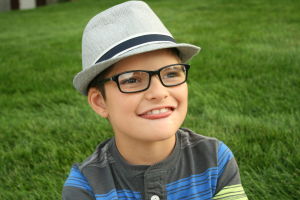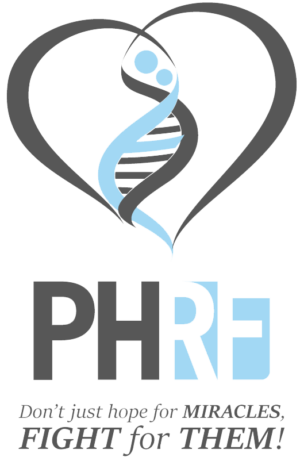 Waking up to the sounds of giggles every morning is one of the best parts of being a mom, according to Tiffany Patten, mother of five-year-old twin boys, Seth and Carter.
Waking up to the sounds of giggles every morning is one of the best parts of being a mom, according to Tiffany Patten, mother of five-year-old twin boys, Seth and Carter.
“They love to snuggle and they have the best laughs ever,” says Patten.
The boys also have Pitt Hopkins Syndrome (PTHS) that is characterized by severe developmental delays as well as seizures. It is also characterized by a joyful vibrancy. And because of that happiness, Patten says that they never have a bad day.
The twins were born on her birthday and she calls them the best birthday presents ever. Shortly after birth, however, Patten and her family knew that something wasn’t right with the boys; they were very developmentally delayed.
Their first birthday came and they still weren’t sitting up. Doctors suggested an undiagnosed chromosome anomaly as a possibility, but Patten wanted a more definite diagnosis.
So, on a whim, a determined mother kind of whim, she emailed Harvard University and asked for help. She and the boys got that help in the form of a trip and a consultation with a pediatric specialist. And while there, Carter and Seth were diagnosed with Pitt Hopkins.
According to the website, “Pitt Hopkins Syndrome (PTHS) is a rare genetic disorder affecting a specific gene in chromosome 18, called TCF4. PTHS is characterized by intellectual disability and developmental delay which range from moderate to severe, possible breathing problems of episodic hyperventilation and/or breath-holding while awake (55 percent to 60 percent), recurrent seizures/epilepsy (40 percent to 50 percent), gastrointestinal issues and distinctive facial features. Children with Pitt Hopkins Syndrome typically have a happy, excitable demeanor with frequent smiling and laughter. PTHS was first described by D. Pitt and I. Hopkins in the Australian Pediatric Journal in 1978. The connection to TCF4 was not established until 2007 when it was found to play an essential role in the development of the nervous system and the brain. Any functional deficiency of TCF4 greatly affects how a child develops over time.”
Receiving the diagnosis was daunting. “Part of me felt relief to have an answer but it also broke my heart—knowing that they would never be little baseball players,” she says.
In a lot of ways they are like any other little boys: they love to eat and they love the water. “When it is bath time they even brush their teeth in the tub and they don’t want to get out; Seth likes to wait until all of the water is out,” says Patten. And they are quick to make their mom laugh because they laugh a lot and that joy is contagious.
“They are usually good friends but sometimes they don’t want to be near each other just like typical brothers,” Patten explains.
They don’t walk but they have super duper cool wheel chairs. “We won’t ever walk around Disney,” she says, but they were treated to a trip to the Magic Kingdom by Dreams Come True recently.
During the year the boys attend Mandarin Oaks and are in a class with five other students. Along with snack and lunch time, the boys also have social time, sensory room time as well as physical therapy and occupational therapy.
The boys attend ESY (extended school year) during the month of July and enjoy keeping the school routine going. “Summer also consists of sleeping late, watching movies, going to the movies and spending time with friends and family,” says Patten.
They are also maneuvering with the added issue of a broken leg right now. “My Carter, who can’t walk, broke his leg and trying to figure out what is hurting from someone who can’t talk isn’t easy,” says Patten. Carter actually got his leg stuck and twisted in the couch and now sports a cast from his toes to his middle thigh. “We thought it was a dislocated hip at first because of the way he was acting,” she says. It was only slightly swollen and there were no bruises or marks. “But the next morning when we got up he wouldn’t move it, so he had multiple X-rays, ultrasound and blood work.” After they decided that his tibia was broken, he had more blood work and a full skeletal survey to make sure everything was ok.
Patten has great family support with Carter and Seth. Her parents, sister, aunt, uncle and friends pitch in to help with baby-sitting and with going on outings. “That is really the hardest part,” admits Patten. “Figuring out the logistics of getting normal stuff done—like going to the grocery store.”
“In the recent past, it was believed that all children affected by PTHS would suffer from severe to profound overall disability, unable to walk, speak or relate to others. All hope was taken away from parents who received a PTHS diagnosis for their children. It’s amazing how this perspective has changed over the last few years. Families from the US and Europe, each with a newly diagnosed child with PTHS, created a Google support group in 2008. This international group now gathers over 225 families worldwide, with a new family joining almost every week. We have found through this support group that the accessible medical literature can be not only impersonal and misleading but often inaccurate in many ways, because much of the research is based on a few severe cases that don’t take into account variability in individual children. In contrast, the collective knowledge obtained by our support group and recent research efforts are showing that PTHS children are creative, vibrant and joyful people continuing to learn over time, and who seem to bring happiness to everyone who knows them. This is truly a message of hope that we aspire to spread around the world.” From the PTHS website
“Having Carter and Seth with PTHS is not the end of the world,” says Patten. “We’re happy and my kids are cool.”
 Anna Martinez, Henry Lenzen’s special education teacher at Fox Hollow Elementary in Aurora, Colorado, will be treating Henry to his first ever running race on September 7th. The Broncos Back to Football race is a 5k during which Anna will push Henry in a running stroller. Drawing inspiration from Team Hoyt, Anna is hoping that this is the first of many races with Henry. Anna set up a myevent page and in one day raised over $1000! Please take the opportunity to look at their page and wish them luck on September 7th!
Anna Martinez, Henry Lenzen’s special education teacher at Fox Hollow Elementary in Aurora, Colorado, will be treating Henry to his first ever running race on September 7th. The Broncos Back to Football race is a 5k during which Anna will push Henry in a running stroller. Drawing inspiration from Team Hoyt, Anna is hoping that this is the first of many races with Henry. Anna set up a myevent page and in one day raised over $1000! Please take the opportunity to look at their page and wish them luck on September 7th! Anna Martinez, Henry Lenzen’s special education teacher at Fox Hollow Elementary in Aurora, Colorado, will be treating Henry to his first ever running race on September 7th. The Broncos Back to Football race is a 5k during which Anna will push Henry in a running stroller. Drawing inspiration from Team Hoyt, Anna is hoping that this is the first of many races with Henry. Anna set up a myevent page and in one day raised over $1000! Please take the opportunity to look at their page and wish them luck on September 7th!
Anna Martinez, Henry Lenzen’s special education teacher at Fox Hollow Elementary in Aurora, Colorado, will be treating Henry to his first ever running race on September 7th. The Broncos Back to Football race is a 5k during which Anna will push Henry in a running stroller. Drawing inspiration from Team Hoyt, Anna is hoping that this is the first of many races with Henry. Anna set up a myevent page and in one day raised over $1000! Please take the opportunity to look at their page and wish them luck on September 7th!






